Protopriest Peter Perekrestov:
“I Don’t Want the Russian Church Abroad to Lose Its Identity”
You were born and reared in the Russian diaspora. Tell us about the people who influenced you in your younger years and nurtured in you a love for the Church and your historic homeland.
– I was born in Montreal, Canada. My father’s father was an officer in the White Army born in Yugoslavia (he was killed by the Reds in 1945), and my mother was evacuated by the Germans from the Soviet Union when she was 13 years old—her father was a regular soldier in the Red Army and disappeared without a trace. The Russian language was the only one used in our home, and when I started school, I didn’t speak a word of English. We often had Russian visitors, including, when possible, people from Soviet Russia, which was a rarity in those days. I remember 1967, when Montreal hosted the International Expo, and the Soviet Union had a huge pavilion and accompanying delegation. Over the summer we visited the expo every week, attended concerts, and we always had Russian guests come visit.
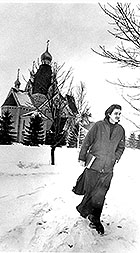 On Saturdays, my brother and I attended Pushkin Russian School, and on Sundays we served as altar boys at St Nicholas Cathedral; in fact, we’d arrive early to participate in the greeting of the bishop; it was far—we had to take the metro and two buses. The parish rector was Archbishop Vitaly (Oustinov), the clergy consisted of monastics, we had no “white clergy” at the cathedral. We were accustomed to it being silent in the altar, with no idle chatter—it was a very pious atmosphere. On Saturdays, my brother and I attended Pushkin Russian School, and on Sundays we served as altar boys at St Nicholas Cathedral; in fact, we’d arrive early to participate in the greeting of the bishop; it was far—we had to take the metro and two buses. The parish rector was Archbishop Vitaly (Oustinov), the clergy consisted of monastics, we had no “white clergy” at the cathedral. We were accustomed to it being silent in the altar, with no idle chatter—it was a very pious atmosphere.
Despite the fact that we grew up in Canada, we had a sort of microcosm of Russia: church life, Russian school, our friends were exclusively Russian, we went to concerts of Russian music (when musicians were on tour), and participated in Russian-school performances. We didn’t consider ourselves Russian-Canadians or Canadians of Russian descent—we were Russians, with a corresponding world view.
You said that monastics served at your church. This probably affected your spiritual upbringing, and the fact that you decided on a priestly career.
– Well, to be honest, I am still crawling, spiritually speaking, not even on all fours yet, though I had quite a few astounding examples of how to lead a spiritual life. I really did grow up in a parish led by monastics, but I really had no idea of the way of life in a monastery when I was growing up. I first visited a monastery in 1972, when I was 16 years old. Our kind Archimandrite Feodor (Golitzin) loved young people, he owned a minivan and always arranged for trips for us—to Transfiguration Skete in Mansonville, to the zoo, to the town of Rawdon which had a chapel dedicated to the Kazan Icon of the Mother of God.
One day, Fr Feodor invited me on a youth trip to Holy Trinity Monastery in Jordanville, NY. It was a fateful trip for me in terms of deciding on my life’s path. I remember every moment: how we approached the monastery on a foggy evening, how monks and seminarians emerged from the church and went to the refectory, how they sang a prayer before dinner. I remember the singing on the kliros, the magnificence of the monastery church, the decorum of divine services, and the hospitable and joyful faces I saw there. I was amazed at all of this. During lunch, one simple monk, Fr Prokopy, asked my name and said: “Come to us this summer.” I took these words to heart.
Upon returning to Montreal, I stopped watching TV, I didn’t miss a single vigil service, even when public transportation was halted due to snow. I constantly listened to recordings of monastic services. Mama was frightened that I would become a monk!
I spent the summer of 1972 at the monastery and decided after my second year at university that I would bind my life to the monastery and seminary. Of course, I still had not made the conscious decision to enter the priesthood. In 1974, I enrolled at Holy Trinity Seminary.
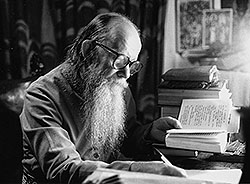
My spiritual and ecclesiastical education was without a doubt connected with the monastery. In those days, the brethren of Holy Trinity Monastery were remarkable—these were people who had endured a great deal in their lives, they survived the Revolution, the Soviet terror, World War II, concentration camps, hunger, the poverty of life as a refugee. There were many simple monks from the peasant stock. But there were also people of culture, of great intellect, for instance, Archbishop Averky (Taushev), Archimandrite Konstantin (Zaitsev) and Archimandrite Kiprian (Pyzhov).
The latter was my spiritual father, and my obedience was to serve as his driver. He tried to instill in me a taste for icon-painting, church adornment, a sense of beauty and harmony, and he also corrected the many grammatical errors in Russian that we seminarians made. Also, once a week, I would drive the teacher of dogmatic theology to the seminary, Protopresbyter Michael Pomazansky, to an old-age home, where his ailing matushka lived. His wise and reassuring words on theological topics during these drives were unforgettable.
Over the course of four years I never witnessed any quarrels or harsh words in the seminary or monastery among the brethren, never heard any insults or complaints, either in the monastery or seminary. During those years, the people there didn’t need to be told what to do, they didn’t need oversight. They performed their monastic duties, they followed the example of their abbot, Archbishop Laurus (the future First Hierarch of the Russian Orthodox Church Outside of Russia). In addition to the spirit of love and faith that reigned at the monastery, I must also mention the spirit of freedom and trust in the seminary. Of course, in the life of the Church, you can force people to observe administrative discipline out of fear, but this wouldn’t so much be a family of Christ as a factory of some sort. In a real Church family, there must be trust and love, and love is always free and is never forced.
I will remember by years in the monastery for my whole life. When graduates of Holy Trinity Seminary of that period gather, we tell endless stories about the monks, the teachers, they were genuine ascetics who expended all their efforts and were paid peanuts for it. We could easily put together 12 volumes of a Jordanville version of the book Everyday Saints, one for every month of the year!
You got to know hierarchs of the “old school,” those who were educated in pre-Revolutionary Russia, those who experience persecution. Who made the greatest impression on you and your classmates?
– Once during a diocesan pastoral retreat, Fr Alexander Lebedeff (now a protopresbyter) of Los Angeles remembered the hierarchs of blessed memory of the Russian Church Abroad: “You know, father, if you think about it, you could probably canonize as a saint half of the bishops of the Church Abroad.” And he’s right: our generation witnessed so much sanctity that words cannot express it. In the history of the Russian Church Abroad, there were three times that a bishop was disinterred—St John (Maximovich), before his canonization; Metropolitan Philaret (Voznesensky) and Bishop Konstantin (Essensky), the remains of whom were all uncorrupt!
The hierarchs of the Church Abroad all lived very modestly, sharing the plight of the other refugees. They did not own expensive cars, they had no entourages of acolytes, personal secretaries, cooks, they did not enjoy earthly fame and influence. One need only remember Archbishop Nikon (Rklitsky), the author of the monumental 17-volume Life of Blessed Metropolitan Anthony (Khrapovitsky) of Kiev and Galicia, who lived in the attic of a church house in one of the worst neighborhoods of New York City. But these bishops were spiritually wealthy, they had great moral authority. Their entire lives were dedicated to serving God, neighbor and Homeland.
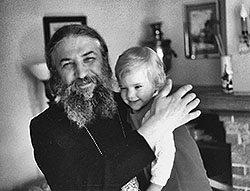  Speaking of hierarchs who made a great impression on me, those would be Metropolitan Laurus (Shkurla) and Archbishop Anthony (Medvedev), the latter having been my ruling bishop and cathedral rector for the first 20 years of my priesthood. I met the future Metropolitan Laurus when I was 15 years old, in Montreal in 1971. The Council of Bishops of the Russian Church Abroad convened there at the time. My brother and I served as acolytes at Liturgy and saw the largest gathering of bishops we had ever seen. My brother told our grandmother about it, and she decided to invite a group of the bishops for dinner, and one evening, after a session of the Council, six or seven bishops came to visit. I remember that the most talkative and loudest was Archbishop Seraphim (Ivanov) of Chicago, and I remember Archbishop Antony (Bartoshevich) of Geneva. Speaking of hierarchs who made a great impression on me, those would be Metropolitan Laurus (Shkurla) and Archbishop Anthony (Medvedev), the latter having been my ruling bishop and cathedral rector for the first 20 years of my priesthood. I met the future Metropolitan Laurus when I was 15 years old, in Montreal in 1971. The Council of Bishops of the Russian Church Abroad convened there at the time. My brother and I served as acolytes at Liturgy and saw the largest gathering of bishops we had ever seen. My brother told our grandmother about it, and she decided to invite a group of the bishops for dinner, and one evening, after a session of the Council, six or seven bishops came to visit. I remember that the most talkative and loudest was Archbishop Seraphim (Ivanov) of Chicago, and I remember Archbishop Antony (Bartoshevich) of Geneva.
The quietest was the youngest and most junior hierarch, Bishop Laurus of Manhattan. He didn’t speak a word during dinner, and impressed me as the humblest of all monks. Still, after dinner, my brother and I and the young cell-attendant of Vladyka Laurus, Paul Loukianoff (now Archbishop Peter of Chicago), had a conversation on the second floor of the house, when suddenly Vladyka Laurus walked in and started a conversation with us.
Thank God, this tradition of accessibility by the bishops of the Russian Church Abroad has survived, even on the level of our First Hierarch, Metropolitan Hilarion.
It was Vladyka Laurus himself who later ordained me a reader and subdeacon, then to the diaconate and priesthood. During my years as a seminarian, I served as a subdeacon with him. Later, after 2000, he entrusted me with authoring several church texts.
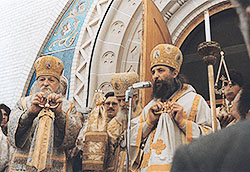 These archpastors—Vladyka Laurus and Vladyka Anthony, had an unbelievable sensitivity to liturgics, a living conception of divine service—on one hand, an ancient, unchanging one, and on the other—a renewable and living one. They taught me the spiritual aspect of church life, how the mechanism of church cooperation and collegiality works. With regard to conciliarity and church order, they adhered strictly to the spiritual legacy of Metropolitan Anastassy (Gribanovsky) of blessed memory, as it relates to the 34th Apostolic Canon* as the cornerstone of establishing relations between a senior hierarch and his brother bishops. I consider these bishops not only my spiritual guides but fathers as well. I often turn to them with the request to pray for me before the Divine altar, to offer me guidance and wisdom in difficult questions and circumstances. These archpastors—Vladyka Laurus and Vladyka Anthony, had an unbelievable sensitivity to liturgics, a living conception of divine service—on one hand, an ancient, unchanging one, and on the other—a renewable and living one. They taught me the spiritual aspect of church life, how the mechanism of church cooperation and collegiality works. With regard to conciliarity and church order, they adhered strictly to the spiritual legacy of Metropolitan Anastassy (Gribanovsky) of blessed memory, as it relates to the 34th Apostolic Canon* as the cornerstone of establishing relations between a senior hierarch and his brother bishops. I consider these bishops not only my spiritual guides but fathers as well. I often turn to them with the request to pray for me before the Divine altar, to offer me guidance and wisdom in difficult questions and circumstances.
In the 1990’s, you started to visit Russia and contact clergymen of the Russian Church in the Homeland. Tell us about your impressions, about the people you met. Howdidtheyreacttoyou?
– I first visited Russia in December, 1989. It was an unexpected trip—I never thought that I would ever travel to my homeland, and it is naturally difficult to express what I felt at the moment. My first contacts there were mostly with clergymen whose positions were similar to those of the Church Abroad with regard to the veneration of the New Martyrs, the Royal Martyrs, with those who considered the Revolution and all of its consequences not so much as a continuation of Russian history as a profound catastrophe, an historical fracture.
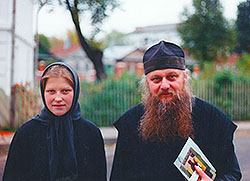 Some of them strove to go under the omophorion of the Russian Church Abroad. Time showed us that some had good intentions, while others sought personal gain or were just passers-by, if not actual provocateurs. Honestly, we were naïve then, we didn’t understand life in the Soviet Union, including Church life. Still, we were obliged to proceed on that path. I think that thanks to the experience, even to the mistakes that we made, we were in fact sometimes led astray, that by the year 2000 we came to understand the real situation in Church life in Russia. We embarked on the path to reestablishing ecclesiastical unity without any illusions, but soberly and with sound judgement. Some of them strove to go under the omophorion of the Russian Church Abroad. Time showed us that some had good intentions, while others sought personal gain or were just passers-by, if not actual provocateurs. Honestly, we were naïve then, we didn’t understand life in the Soviet Union, including Church life. Still, we were obliged to proceed on that path. I think that thanks to the experience, even to the mistakes that we made, we were in fact sometimes led astray, that by the year 2000 we came to understand the real situation in Church life in Russia. We embarked on the path to reestablishing ecclesiastical unity without any illusions, but soberly and with sound judgement.
We were viewed in different ways be the people of Russia. For some we represented their “ticket abroad,” or a source of humanitarian aid. For others we were real Russians, the heirs of the pre-Revolutionary, exiled Russia. For others still we were foreigners, ideological foes. But usually, after we got to know each other better, even those who were very wary of us changed their opinion. We became, if not friends, then at least fellow-warriors for Christ, people who loved the Church and our Homeland.
Among the clergymen I became close with in the 1990’s, with whom I maintained contact for many years, were Protopriest Lev Lebedev of Kursk, Protopriest Anatoly Yakovin from the town of Velikodvoriye in the Gus-Khrustal region of Vladimir oblast, Protopriest Mikhail Zhenochin from Gdov in Pskov oblast and Protopriest Vasily Ermakov of St Petersburg.
You have served at the cathedral in San Francisco for many years, which contains the uncorrupt relics of St John, the great archpastor of the Russian diaspora. You have probably witnessed miracles that resulted from his prayers…
– For all my years as a priest I have served at the cathedral in San Francisco and I never cease to marvel at the mercy that the Lord granted me and my family. Whether an episcopal consecration or a priestly ordination, the cleric becomes betrothed to his diocese, to his parish, just like a husband and wife are joined in the Mystery of matrimony.
And of course, it is a special mercy of God to serve in a church where one of the greatest hierarchs of the Russian Orthodox Church of the 20th century served, St John of Shanghai and San Francisco the Miracle-worker. Not only do I serve here, but I witnessed how people venerate him, I was there when his relics were opened, participated in his canonization ceremonies, the yearly “mid-year Pascha,” which is what we call his feast day. And of course, the day-to-day miracles from his prayers. The priests of the cathedral see and hear about so many miracles that they have become the norm rather than the exception. I can’t point to anyone who has knelt before St John’s relics in prayer, asking for his heavenly intercession, who did not clearly receive aid and consolation from him. Sometimes people don’t get the result they want, but always gets a result that will benefit them. Mostly people receive specifically that which they asked for.
Are you still researching the spiritual legacy of St John?
– Yes, I am still interested in everything having to do with St John, and when I find new or previously-unknown material, I record it. In 2008, compiling the first large compendium of remembrances of Vladyka (Vladyka Ioann—svyatitel’ Russkogo Zarubezhiya, Moscow, Sretensky Monastery, publ.), I thought that I gathered practically all the recollections and testimony about his life, but I was wrong. Over the 8 years since the book was published, a whole series of new articles has been published with interviews of people who knew Vladyka John.
In 2016, I began in earnest to compile a new book on St John, memoirs of his contemporaries. By Divine mercy, this book, Pastor. Teacher. Friend. is finished—it will be presented in the cities of Tver and Moscow this September. I must say that this book is interesting, vibrant, and at times unbelievably endearing. A good number of unpublished photographs of Vladyka are included.
You have served in the Russian Church Abroad for over 35 years. In the diaspora it is necessary to strive to preserve not only our forefathers’ faith, but our native language and Russian culture. The Church Abroad ministers to many new émigrés, along with American converts to Orthodox Christianity, Canadians, Frenchmen, Australians. How is this kind of ministry different? Has your pastoral practice changed over this time?
– When I was ordained to the priesthood, most of our cathedral’s parishioners were from the old emigration, mostly from China, though there were a good number of new converts. Over the years since, the composition of the parish has changed drastically: the older generation has passed into the other world, their descendants intermarried with Americans, the number of new converts is growing, many of our parishes are now filled with recent émigrés from the former Soviet Union.
If earlier we ministered to people who were Orthodox Christians from birth, then starting in the 1990’s, a new kind of worshiper arrived—those who knew little about the Church, divine services, about Orthodox Christianity in general. Among the new converts and descendants of old émigrés there is a vast cultural divide, and a difference in lifestyle. But people who grew up in the Church since childhood often lack zeal, they might take Orthodoxy for granted. Meanwhile, new people, from Russia and American converts, often have a certain fervor, they ask questions, they desire to work, though they lack the knowledge of traditions. Hieromonk Seraphim (Rose) of blessed memory would say that Russian have patience, but not zeal, while converts have zeal but lack patience, and these two qualities must be united.
We must minister to everyone that the Lord sends us today, not just wish that things were simpler. My personal experience has shown that everyone can be united on the foundation of Orthodox Christianity, every obstacle can be overcome, communion between all people can bring joy and spiritual consolation, and remarkable fruits in the harvest-fields of Christ. Our parish today boasts a great variety of people: old émigrés from China and Europe, their descendants, often married to Americans, newly-converted Americans, Eritreans, Serbs and Romanians, new émigrés from Russia, Ukraine and Belarus. Thank God, the work of salvation is being done, though at a slow pace.
What do you deem most important in what is called the “second Baptism of Rus?”
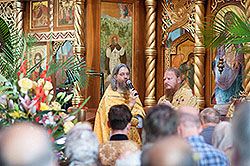 – If you’re talking about the period that began in 1988, I am of course overjoyed at the rebuilding of churches in Russia, the multitudes that have come to the Faith, the teeming publication of religious literature—books are not only printed, people buy them and read them—the rebirth of the work of the Church in social and charitable spheres. It brings joy that we, “scattered in the diaspora,” can travel to our Homeland, maintain a living bond with the Church in Russia, with remarkable people, we can celebrate Liturgy in the Russian land. – If you’re talking about the period that began in 1988, I am of course overjoyed at the rebuilding of churches in Russia, the multitudes that have come to the Faith, the teeming publication of religious literature—books are not only printed, people buy them and read them—the rebirth of the work of the Church in social and charitable spheres. It brings joy that we, “scattered in the diaspora,” can travel to our Homeland, maintain a living bond with the Church in Russia, with remarkable people, we can celebrate Liturgy in the Russian land.
But of course there has never been a period of total well-being and peace in the Church, from the very birth of Christianity: “I was persecuted, you shall be persecuted; I was hated, you shall be hated; sorrow shall fill you heart in the world.” Therefore, whatever positive changes have taken place in the status of the Church, there will always be strife, both visible and invisible, there will always be enemies—from within and from without. There will not only be victory and celebration, but sorrows and new challenges.
When the Church is persecuted, the faithful pray for freedom of religion, for strength to carry one’s cross, for courage to be faithful to Christ to the end. When persecutions cease, new struggles and temptations arise—comfort, power, self-satisfaction and indifference, greed, gluttony, sloth…
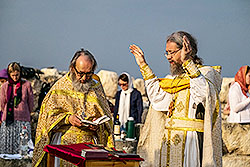 Are our clergymen effective in these new circumstances? Are our clergymen effective in these new circumstances?
– I can only speak for those whom I see myself—my brethren clergymen in the Western American Diocese. We have remarkable clerics, our priests are forced to work hard, to find time for both Church and civil work (many need to have a full-time job to support their families). It is notable that we are all brothers in Christ, our diocesan clergymen are very friendly; it is a real fraternity.
Do you think that the Church Abroad has a special mission? What can she offer the Mother Church and Universal Orthodox Christianity?
– Someone recently asked me this question during a meeting with the students of St Tikhon Humanitarian University in Moscow. I couldn’t provide an answer. I think that it should be asked of representatives of the Church in Russia, and of the other Orthodox Churches—only they can say what they see as valuable contributions of the Russian Church Abroad, what they think is important and beneficial from what we experienced, having been a Church in exile, materially poor, but without a doubt spiritually wealthy.
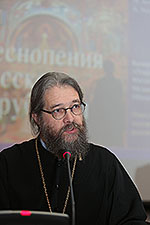 I remember well the first official visit of Metropolitan Laurus with a delegation of the Russian Orthodox Church Outside of Russia in 2004. What could our First Hierarch, a humble and quiet monk, devoid of any thirst for power, bring to the enormous Church in the Homeland? But I was amazed how many senior bishops changed in the presence of Vladyka Laurus, how they softened, began to smile, warmed to the occasion. They saw and sensed something in this humble and meek monastic. But then this “novice of novices of the Church Abroad” (as Bishop Evtikhy [Kurochkin] called him) became a powerful tool of God—he and His Holiness Patriarch Alexy II achieved what was “impossible for man,” they reestablished unity within the Local Russian Church, the 10th anniversary of which we now celebrate. I remember well the first official visit of Metropolitan Laurus with a delegation of the Russian Orthodox Church Outside of Russia in 2004. What could our First Hierarch, a humble and quiet monk, devoid of any thirst for power, bring to the enormous Church in the Homeland? But I was amazed how many senior bishops changed in the presence of Vladyka Laurus, how they softened, began to smile, warmed to the occasion. They saw and sensed something in this humble and meek monastic. But then this “novice of novices of the Church Abroad” (as Bishop Evtikhy [Kurochkin] called him) became a powerful tool of God—he and His Holiness Patriarch Alexy II achieved what was “impossible for man,” they reestablished unity within the Local Russian Church, the 10th anniversary of which we now celebrate.
Now it is no longer “us” and “them,” just a unified flock of the Church of Christ.
What pastoral and general ecclesiastical matters are most crucial for you now?
I am worried about the future of our Orthodox parishes in California—the state has become very expensive to live in. Over recent years a great number of people left San Francisco because of the price of real estate. In 2015, for the first time in the history of San Francisco, the average price of a house in the city exceeded $1 million! Now the average price has risen another $500,000! This cannot but have an effect on the number and demographics of our parishioners.
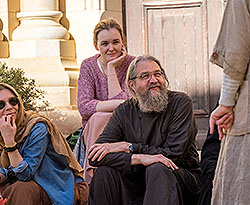 With regard to general Church matters—I am concerned about the preservation of the traditions and legacy of the Russian Church Abroad. I think that the Church Abroad is an utterly unique phenomenon: she has her own image, her own experience. On one hand, it is the flesh and blood of the pre-Revolutionary Russian Church. On the other hand, thanks to the fact that her parishes are scattered throughout the whole world and she is present under very different circumstances, it is very contemporary, alive, and very dynamic. With regard to general Church matters—I am concerned about the preservation of the traditions and legacy of the Russian Church Abroad. I think that the Church Abroad is an utterly unique phenomenon: she has her own image, her own experience. On one hand, it is the flesh and blood of the pre-Revolutionary Russian Church. On the other hand, thanks to the fact that her parishes are scattered throughout the whole world and she is present under very different circumstances, it is very contemporary, alive, and very dynamic.
She has collected a great pool of experience in serving and ministering among the widest range of peoples. She has her own identity, her own pastoral approach, a “style,” if you will, even when you consider how her priests have long hair and go everywhere in their cassocks. Over recent years, I think, we have begun to lose this “identity,” not only externally but internally, too. Maybe this is a general trait of today’s clergymen—both of those who grew up abroad and those who came from the countries of the CIS.
Sometimes I get the impression that this generation has little interest in our legacy: who served before us, how they lived and ministered, what motivated them. There is little interest in Liturgical matters, in traditions. I wouldn’t like it if the Russian Church Abroad lost her identity, abandoned her traits and character, which set her apart so many years. Maybe in a global sense, this identity is unneeded, but in my opinion, this would be a great loss for Orthodoxy.
Maybe the unique characteristics of the Church Abroad are simply a few small flowers in the grand bouquet of universal Orthodoxy, but without these flowers, the Orthodox world would lose something.
I am also concerned with the question of sobornost’ [collegiality] in the Church—not only in the Russian Church, but in all the Local Orthodox Churches. This includes the matter of ecclesiastical authority. Sometimes, when you read certain documents and communiqués, it seems that the most important topic on the agenda of the Pre-Council Conference in Chambesy as well as the Assembly of Canonical Orthodox Bishops in America is the question of supremacy and primacy. One can’t help but wonder: is this the most important thing in the life of the Orthodox Church today? Is an 8th Ecumenical Council going to be convened for this reason? Does it matter who reigns when we consider the future of Orthodoxy? Does this correspond to the spirit of the Gospel? Is this so important for the Christian mission in the world today? What does this have to with witness, with parish and monastic life, with the needs of our flock?
No less important are the challenges facing the Church today. The unchanging faith of Christ exists in the rapidly and radically changing world. How do we find the answers, the approaches, the words for contemporary man? Right before our eyes they are legalizing a new form of union—same-sex “marriage” and everything associated with it. Along with this is the persistent attempts to define what it means to be male or female, what a family is.
Maybe contemporary man no longer feels a need for the Church?
– As long as there is illness and pain in the world, we need hospitals and doctors, medicine and therapy. As long as the world contains sin, suffering, death, as long as there is the search for meaning in life, the striving for eternity, the need for love, the Church of Christ will be needed, which is a spiritual hospital, the only place on earth where you can find consolation, true joy, peace and eternity, where you can fully meet with God. In the words of Metropolitan Athanasios of Limassol: “The Church is like a wedding palace, a place where God unites with man. It is within the Church that God became man.”
The Church in this world will always be needed, and today and in the future, even more than ever.
Interviewed by Protopriest Serafim Gan.
*) The bishops of every nation must acknowledge him who is first among them and account him as their head, and do nothing of consequence without his consent; but each may do those things only which concern his own parish, and the country places which belong to it. But neither let him (who is the first) do anything without the consent of all; for so there will be unanimity, and God will be glorified through the Lord in the Holy Spirit.
|